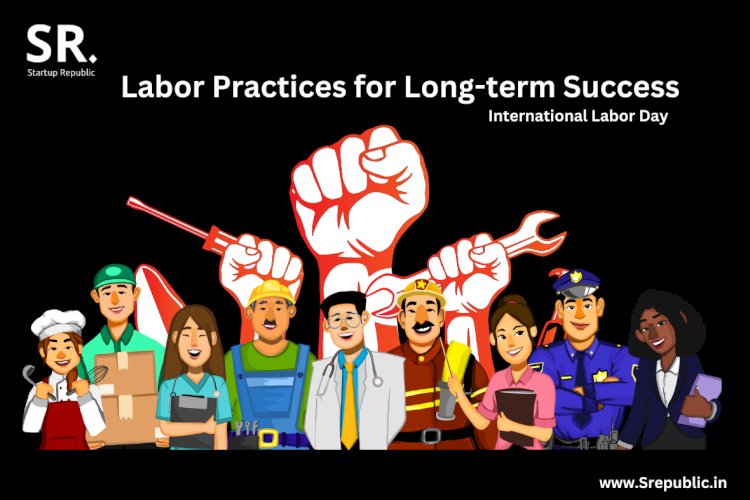International Labour Day: Why Startups Must Prioritize Fair Labor Practices for Long-term Success

International Labour Day, also known as May Day, is celebrated on May 1st every year to recognize and honor the contributions of workers and laborers worldwide. The day has its roots in the labor movement and is now observed in over 80 countries, with parades, rallies, and events highlighting the importance of fair labor practices and workers' rights.
Startups are at the forefront of innovation, disrupting traditional industries and creating new markets. However, with this innovation comes a responsibility to prioritize fair labor practices and ensure that employees are treated with dignity and respect. In this blog post, we will explore why startups must prioritize fair labor practices and the benefits of doing so.
What are fair labor practices?
Fair labor practices refer to the set of principles and guidelines that govern how employers treat their employees. These include but are not limited to, fair wages, reasonable working hours, safe working conditions, non-discrimination, and freedom of association. Fair labor practices ensure that workers are treated with dignity and respect, and their fundamental rights are protected.
Why startups must prioritize fair labor practices?
Startups have a unique opportunity to build a culture of fair labor practices from the ground up. By prioritizing fair labor practices, startups can attract and retain top talent, increase productivity, and create a positive reputation in the market. Here are some reasons why startups must prioritize fair labor practices:
- Attract and retain top talent
Talented employees are the lifeblood of any startup. By prioritizing fair labor practices, startups can attract and retain top talent. Employees want to work for companies that value their contributions and treat them with respect. Fair labor practices can help create a positive work environment where employees feel valued and appreciated.
- Increase productivity
Fair labor practices can also increase productivity. Employees who are treated fairly are more likely to be motivated and engaged in their work. When employees are motivated, they are more productive, which can lead to increased profitability for the company.
- Create a positive reputation
Startups that prioritize fair labor practices can create a positive reputation in the market. Customers, investors, and other stakeholders are more likely to support companies that are committed to treating their employees fairly. A positive reputation can help startups attract new customers, investors, and partnerships.
- Compliance with labor laws
Startups that prioritize fair labor practices are more likely to comply with labor laws and regulations. Compliance with labor laws is not only important for avoiding legal issues, but it also ensures that employees' fundamental rights are protected.
What are the benefits of fair labor practices for startups?
Startups that prioritize fair labor practices can reap a variety of benefits. These include, but are not limited to:
-
Increased productivity: Fair labor practices can lead to increased productivity, which can help startups achieve their business goals.
-
Attract and retain top talent: By prioritizing fair labor practices, startups can attract and retain top talent, which is critical for long-term success.
-
Positive reputation: Startups that prioritize fair labor practices can create a positive reputation in the market, which can help attract new customers, investors, and partnerships.
-
Compliance with labor laws: Prioritizing fair labor practices can help startups comply with labor laws and regulations, which is important for avoiding legal issues and protecting employees' rights.
How can startups prioritize fair labor practices?
Startups can prioritize fair labor practices by:
-
Setting clear policies and guidelines: Startups should develop clear policies and guidelines that outline their commitment to fair labor practices.
-
Providing fair compensation: Startups should provide fair compensation to their employees, including salaries, benefits, and bonuses.
-
Offering flexible work arrangements: Startups should offer flexible work arrangements, such as remote work or flexible schedules, to accommodate their employees' needs.
-
Ensuring safe working conditions: Startups should ensure that their employees work in safe and healthy environments that meet industry standards.
-
Avoiding discrimination: Startups should avoid any form of discrimination, including discrimination based on race, gender, age, religion, or sexual orientation.
-
Providing opportunities for growth and development: Startups should provide opportunities for their employees to grow and develop professionally, including training and development programs and opportunities for career advancement.
-
Encouraging employee feedback: Startups should encourage employee feedback and take it seriously, as it can help identify areas where fair labor practices can be improved.
In conclusion, startups have a unique opportunity to prioritize fair labor practices and create a positive work environment for their employees. By doing so, they can attract and retain top talent, increase productivity, and create a positive reputation in the market. Startups can prioritize fair labor practices by setting clear policies and guidelines, providing fair compensation, offering flexible work arrangements, ensuring safe working conditions, avoiding discrimination, providing opportunities for growth and development, and encouraging employee feedback. By prioritizing fair labor practices, startups can create a sustainable business that benefits both their employees and their bottom line.

 Lalita Singh
Lalita Singh 





















